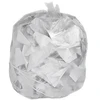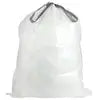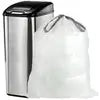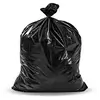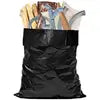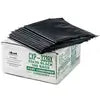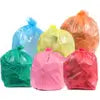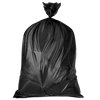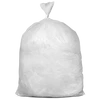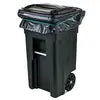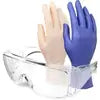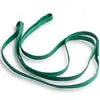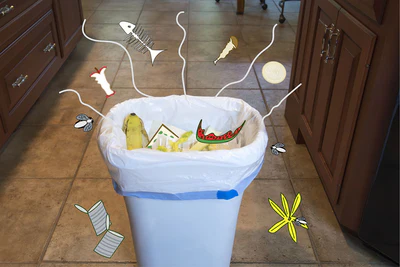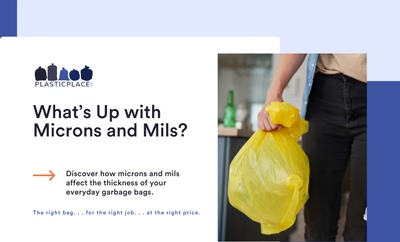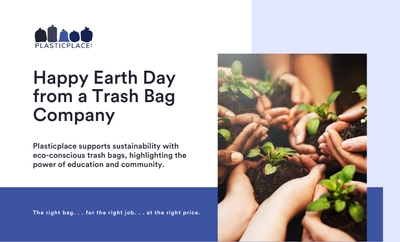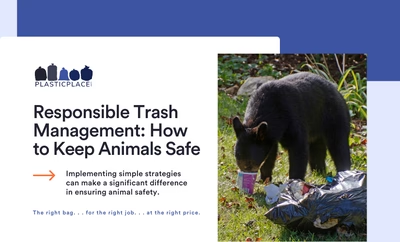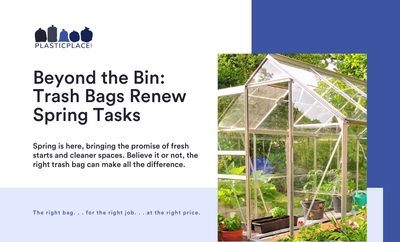When you’re trying to pick up a good habit, research shows that the easier you make the task, the more likely you’ll be to stick with it. Recycling is unquestionably a good habit, but it’s one that can require some effort to integrate into your life. So, you might wonder — how can I make recycling more convenient so that I do it more consistently and correctly?
Below, we’ll show you some sustainable lifestyle tips that will help you bring recycling and other parts of the circular economy into your lifestyle. From simple tweaks in your routine to memory-joggers to help you remember to recycle the right way, we’ve got ten easy recycling ideas that will minimize the burden on your busy mind and schedule.
1. Hang a recycling chart above your bin.
For a lot of folks, it can be surprisingly tough to remember what’s recyclable and what isn’t. You don’t want to add the wrong items and potentially get your recyclables sent to the landfill, but you also don’t want to be throwing away items you could recycle. Sure, there’s Google, but because local recycling programs vary so much, it can take forever to find the answers you’re looking for.
Recycling charts are here to save the day! These are exactly what they sound like: a chart of recyclable and non-recyclable items, usually hung on the wall near your recycling bin. Start by checking the website of whoever administers your local recycling program. Many recycling programs create their own charts to help people recycle correctly.
Alternatively, just make your own recycling chart! Research what is and isn’t recyclable in your area, and then write it down and hang it up so you’ll have it available for future reference. Your chart could be a plain piece of paper or an illustrated and laminated work of art — it’s up to you! Think about adding relevant info to your chart like your recycling pickup schedule too.
2. Remember the big three: empty, clean and dry.
Recycled containers have to be free of food and drink residue. Thus, before you toss something in the recycling, think of this three-part rule: empty, clean and dry!
- Empty: Does the container still have any of its original contents? If so, discard them.
- Clean: Does the container have a lot of residue from its contents? (Looking at you, peanut butter jar!) If it does, give it a quick rinse — enough to get most of the residue out.
- Dry: Is the container wet? Wipe it out with a kitchen towel or let it stand to dry for a few hours before putting it in the bin.
 What’s the reason behind these requirements? Wet containers or food residue can damage other recyclables, like paper or cardboard, making them unusable. They also provide an ideal home for mold to grow, which will make a foul-smelling mess in your bin. Finally, food smells in your recycling bin make it more likely to attract rodents, raccoons and other pests.
What’s the reason behind these requirements? Wet containers or food residue can damage other recyclables, like paper or cardboard, making them unusable. They also provide an ideal home for mold to grow, which will make a foul-smelling mess in your bin. Finally, food smells in your recycling bin make it more likely to attract rodents, raccoons and other pests.
3. Keep your recycling bin clean and consider lining it with a recycling bag.
A recycling bin won’t be a pleasant part of your life if it fills your kitchen or garage with bad odors. “But wait,” you might say, “How can a recycling bin smell bad?” Well, if you always clean your recyclables perfectly, it won’t!  However, because we’re all human, it’s not uncommon to accidentally leave a few drops of milk, juice or other liquids in your recyclables. When these leftover liquids trickle out into your recycling bin, they can give it a majorly funky smell. It can be even worse if you’ve let something get into your recycling bin that doesn’t belong there, such as rotten food.
However, because we’re all human, it’s not uncommon to accidentally leave a few drops of milk, juice or other liquids in your recyclables. When these leftover liquids trickle out into your recycling bin, they can give it a majorly funky smell. It can be even worse if you’ve let something get into your recycling bin that doesn’t belong there, such as rotten food.
Luckily, soap and water are all it usually takes to clean your recycling bin and eliminate its odors. Ultimately, prevention is the best solution, so consider using a recycling bag to line your recycling bin. This will collect any drips of liquid that make it into the bin. If it starts to smell, just change the bag!
One more tip: If you’re going to use a bag, make sure you have one that fits securely! If you’re using a Simplehuman® trash can, be sure to check out our full selection of Simplehuman® garbage bags for an ideal fit. Many people also use trash can rubber bands to secure their recycling bag and prevent it from slipping down into the bin.
4. Use recycled products such as eco-friendly trash bags.
The materials you recycle can eventually become durable and useful post-consumer products — so why not put those products to work in your own life? Using recycled versions of everyday products like trash bags is a simple way to reduce your own waste footprint and integrate the circular economy into your lifestyle.  Recycled products are made to the same standards of quality that you’ll find in ones made from virgin materials. Plasticplace’s recycled eco-friendly trash bags are made from at least 80 percent recycled plastic while keeping the same great performance that our customers expect. Each bag even features an anti-microbial finish to help keep trash odors under control!
Recycled products are made to the same standards of quality that you’ll find in ones made from virgin materials. Plasticplace’s recycled eco-friendly trash bags are made from at least 80 percent recycled plastic while keeping the same great performance that our customers expect. Each bag even features an anti-microbial finish to help keep trash odors under control!
Of course, this doesn’t have to end at trash bags. Recycled versions of many different kinds of packaging are available! Try looking for food and household products in recycled packaging, or learn about some of the many clothing brands that offer clothes made from post-consumer materials. The more consumers purchase these goods, the more of them manufacturers will produce — a virtuous cycle that helps everybody, including the planet!Order Your Eco-Friendly Trash Bags Now
5. Start “precycling,” or reducing the amount of recyclables that your household creates.
Recycling is much easier when you work on reducing and reusing first. By making some tweaks to your lifestyle — known as precycling — you can reduce the amount of recyclables you produce. That, in turn, means fewer recyclables to handle, clean and take to the curb.
Here are some steps you can take to get started with precycling:
- Use reusable bags when you go shopping.
- Get a seltzer machine to replace canned sparkling water.
- Buy dry goods unpackaged in bulk using reusable containers.
- Start using reusable cleaning products and containers.
- Repurpose containers, such as using glass jars for drinking glasses.
- Use double-sided printing to conserve paper.
6. Donate your old electronics and clothes if they’re in good condition.
While items like clothes and electronic devices can’t go in your curbside bin, they can often live a whole new life after you’re done with them! Lots of different options exist for donating electronics and clothes that you don’t use anymore, and it can offer a great way to declutter your life while helping people in need. So long as your clothes are in good condition, think about donating them to a charity or thrift store near you. Electronic devices like smartphones can often be donated to shelters or other social service organizations. Before you donate, take a minute to check the organization’s website and verify that they accept what you’re donating — Goodwill, for example, no longer takes CRT TVs. Always be sure to wipe your personal devices before donating them.
So long as your clothes are in good condition, think about donating them to a charity or thrift store near you. Electronic devices like smartphones can often be donated to shelters or other social service organizations. Before you donate, take a minute to check the organization’s website and verify that they accept what you’re donating — Goodwill, for example, no longer takes CRT TVs. Always be sure to wipe your personal devices before donating them.
This kind of “beyond the bin” recycling is especially important because it helps you connect your environment and your community. By doing what’s right for one, you’re also helping the other. Plus, you’ll love how much space it can free up in your own life to get rid of that pile of old shirts that’s been occupying your closet!
7. Make recycling a household effort.
Other people in your household have a key role to play in how you recycle! It’s important that everyone in your home is on the same page about recycling. Recycling requires more effort when you have to deal with contamination of your recyclables from roommates, spouses or kids who aren’t aware of the recycling rules. In some cases, a simple conversation might be enough to set things straight. In others, you might need to cover the rules of recycling in more detail, especially if you have multi-stream recycling or another system that’s a little more complex. You might be able to make it easier for everyone to remember by using colored trash bags to differentiate which materials go where.
For parents of young kids, household recycling can also be a fun and informative way to talk about saving the environment. Go over some simple recycling rules together and talk about why it’s important to follow them. Learn about how long trash remains undecomposed after it’s thrown out and where it ends up. These are the kinds of conversations that help build lifelong recycling habits!
8. Create an easy spot for collecting bottles and cans in your car.
When you’ve finished an on-the-go beverage, it’s easy to let the aluminum can or plastic bottle languish in your vehicle for far too long. That’s why it can be a great idea to keep a small clear trash bag in your vehicle to collect all of those stray recyclables. It’ll help keep your interior looking neat, as well as giving you a convenient reminder to recycle them when you need it.
Once the bag has filled up and it’s time to clear your vehicle out, you can simply dump the contents of the bag in your curbside recycling bin on your way into your home. Not only are you now recycling, but you’re also keeping your car squeaky clean. Note that we said the contents, not the bag — remember, single-stream recyclables shouldn’t be bagged!
9. Start composting the easy way.
While composting and recycling aren’t the same thing, composting does offer yet another great way to enter the circular economy. This process takes everyday waste streams like food scraps and yard waste and breaks them down into eco-friendly fertilizers, using just the natural processes of decay. Best of all, there are convenient ways to do it — no need to start a worm farm unless you want to! The classic way to compost is in your backyard or another outdoor space at home. There are tons of different methods, and options like a simple backyard compost pile require minimal effort once you’ve got them going. Beginners should check out our guide to making compost in a garbage bag — it’s one of the easiest ways to do it, and a great way to get started.
The classic way to compost is in your backyard or another outdoor space at home. There are tons of different methods, and options like a simple backyard compost pile require minimal effort once you’ve got them going. Beginners should check out our guide to making compost in a garbage bag — it’s one of the easiest ways to do it, and a great way to get started.
If there’s a public or private compost pickup service available where you live, it offers an opportunity to take your composting convenience to the next level. Before using one of these services, check exactly what they accept and find out if you need to place your compost in a compostable trash bag.
10. Schedule regular times for recycling other items like plastic bags and electronics.
Some items can’t be recycled in your curbside single-stream bin but are recyclable at designated drop-off points. This category includes items like plastic shopping bags, used lithium batteries and broken electronics. Unfortunately, dropping these items off can be the kind of task that always gets pushed back — so try scheduling it in advance!
You might not have the time — or the need — to make these stops every day, but scheduling a regular time to do it will help you keep it top of mind. Try setting a reminder once a month to at least check whether you have these drop-off recyclables lying around, and make a quick stop at your designated recycling point if you do. Not sure where you can recycle these items? Recycling centers, electronics stores, hardware stores and all kinds of other places offer drop-off points. You can use sites like Earth911 to find places that accept the right materials for recycling — just enter your zip code and what you want to recycle. Discover Various Colored Trash BagsWe care about protecting the Earth just as much as our customers do. That’s why Plasticplace offers a full selection of recycling bags, compostable trash bags and so much more. Plus, remember that all of our bags come with fast, free shipping to the lower 48 U.S. states!
Image Credits:Anna Hoychuk/Shutterstock.com
Pavlo S/Shutterstock.com
kazoka/Shutterstock.com
New Africa/Shutterstock.com
suriya yapin/Shutterstock.com
Rawpixel/Shutterstock.com
 4.9 out of 5
4.9 out of 5 











